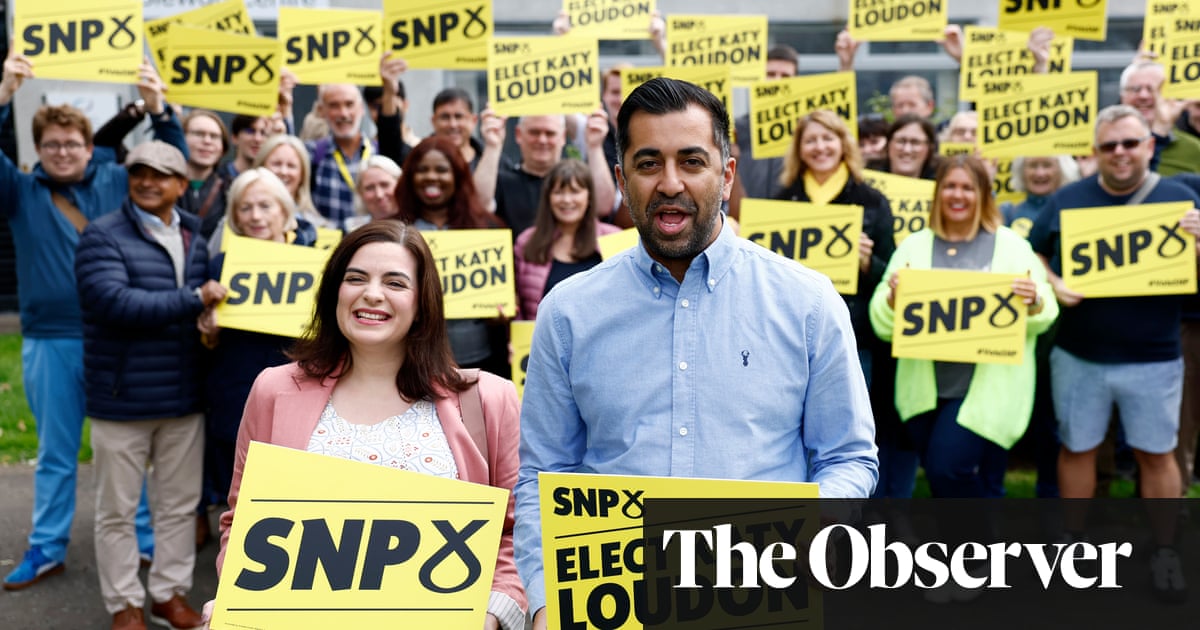
“Trust has been broken.” “A line has been crossed.” “The prime minister’s position is no longer tenable.” While Conservative MPs have largely nursed their anger privately at the barrage of lockdown-busting party revelations from Downing Street, their Scottish MSP counterparts were blunt and unbridled last week, calling for Boris Johnson to quit in a rebellion that was as unprecedented as it was united.
Almost all the 31 Scottish Tory MSPs publicly supported their leader, Douglas Ross, after he became the first senior Tory figure to “regretfully” call for Johnson’s departure, following the prime minister’s admission at PMQs last Wednesday that he had attended a party at Downing Street in May 2020 which contravened his government’s own lockdown rules.
While Ross’s predecessors, Ruth Davidson and Jackson Carlaw, have likewise called for the PM to go, the Scotland secretary, Alister Jack, is the only one of six Scottish Tory MPs to openly back Johnson, suggesting his Holyrood colleagues “reconsider” their position if Sue Gray’s report exonerates Johnson.
But the MSPs’ support for their leader’s stand appears to have been solidified by outrage at the response from the leader of the Commons, Jacob Rees-Mogg, who dismissed Ross as “lightweight” and – wrongly – accused him of serial disloyalty.
Sotto voce suggestions from some English colleagues that Scottish Tories were playing to the gallery, or pre-empting Scottish Nationalist criticism at Holyrood, are dismissed by those more familiar with the local dynamics.
There are frustrations and tensions within any political party, says one senior source, but this was an exceptional circumstance given Ross had stated explicitly both earlier last week and last month that Johnson should resign if it emerged that he had misled parliament: “Douglas Ross is very principled: he resigned over Dominic Cummings, he called out Nicola Sturgeon [when she was accused of misleading parliament over the Alex Salmond crisis], and he had no alternative here.”
The reasons for this escalation in long-recognised and sometimes creative tensions with the Westminster party are both principled and practical, says Adam Morris, a communications consultant and former head of media for the Scottish Conservatives: “Douglas had no choice but to ramp up his position. He’s taken a strong position on this before and was not comfortable with taking responsibility for something he didn’t do and wouldn’t have done.”
Morris points out it is not as easy to hide at Holyrood: the MSP group was doorstepped on their way in to first minister’s questions last Thursday, where Sturgeon said Rees-Mogg had illustrated the Tories’ “utter contempt” for Scotland. “If they can’t even show basic respect for their own colleagues, what chance do the rest of us have?” she said.
On his way to the session, Jamie Greene, the Scottish Tory party’s justice spokesman, urged Rees-Mogg to “go and have a long lie down, maybe not in the House of Commons,” referring to the notorious image of the minister lounging on the green benches. Others vented frustration that remarks such as Rees-Mogg’s not only write the pro-independence playbook, but make it substantially harder to convince Scottish voters that the UK Tories genuinely care about Scotland’s place in the union.
Morris says that, while Ross probably laughed off the remarks, he remains angry about the wider circumstances. “Why is he getting put through all this weeks before the first [council] elections he has fought as leader in the Holyrood parliament? He is furious at the distraction.”
Ross was still to be re-elected as an MSP and had been leader for just nine months when he successfully defended all Scottish Tory seats at last May’s Holyrood election, despite the continuing Brexit fallout and the popularity of Sturgeon’s pandemic leadership.
Sources suggest support within the MSP group for Ross’s position was not heavily orchestrated, but happened naturally. It is understood that many MSPs are disheartened at the lack of airtime to discuss their own policy agenda, or indeed Scottish government failings, because of scandals emanating from Westminster.
Even before his election as UK leader, senior Scottish Conservatives feared Johnson could be a “catastrophe” for the UK, turbocharging the campaign for Scottish independence, and reportedly codenamed attempts to foil him “Operation Arse”. Last month, Ipsos Mori recorded its lowest ever approval levels for the prime minister among Scottish voters.
MSPs appeared in contemplative mood over the weekend, with some reportedly shocked at the extent of the backlash from Westminster: what may smart more than Rees-Mogg is the usually soothing Michael Gove’s dismissal of Ross as being “in Elgin and the national Tory leader is in London”. Nonetheless, anger from England is more than matched by the anger of Scottish constituents.
MSP Sue Webber described Ross’s call for Johnson’s resignation as “a decision with potentially far-reaching impact”. Already the discussion is moving to the possibility for a breakaway or allied centre-right party, first proposed by respected veteran MSP Murdo Fraser a decade ago.
More pressingly, if Johnson clings to his premiership, the rift with Westminster can only deepen as the council elections approach. What will the impact of such a toxic stalemate be on the doorstep for MSPs who are desperate to discuss their own ideas for a right to recovery for drug addicts or scrapping the “not proven” verdict to benefit sexual assault complainers? And how will it benefit a Scottish Labour party – which pledged last week it would stand only pro-union candidates – desperate to beat the Tories back into third place?












